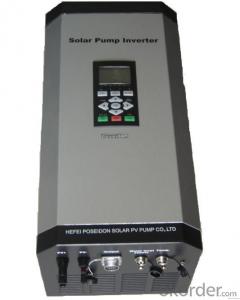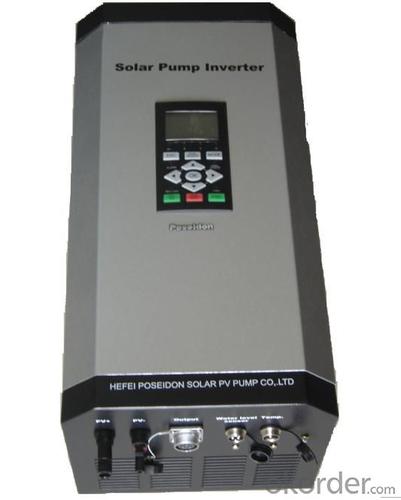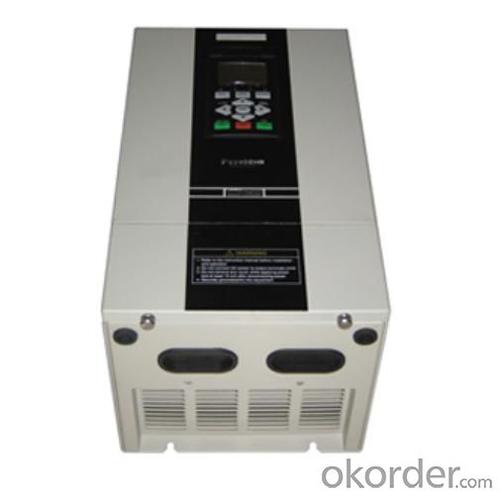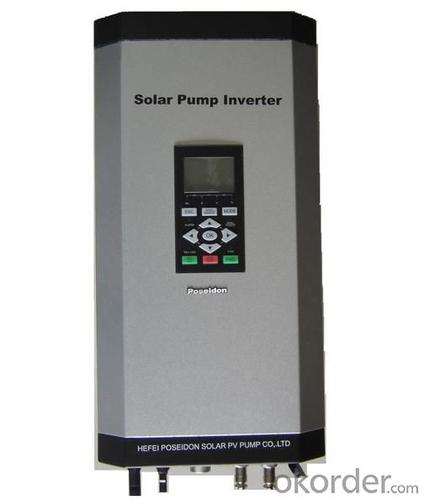Solar pump inverter FCPM1500L
- Loading Port:
- China Main Port
- Payment Terms:
- TT OR LC
- Min Order Qty:
- -
- Supply Capability:
- -
OKorder Service Pledge
Quality Product, Order Online Tracking, Timely Delivery
OKorder Financial Service
Credit Rating, Credit Services, Credit Purchasing
You Might Also Like
Solar pump inverter FCPM1500L Product Description:
Solar water pumping system is constructed with solar panel array,solar pump inverter and AC water pump, DC current produced from solar panel will be delivered to solar pump inverter,and it will convert it into AC current to drive water pump,and will automatically regulate output frequency according to sun radiance intensity,maximally realize MPPT tracking function.
Features
Adopting the proposed dynamic VI maximum power point tracking (MPPT) control method, with fast response, and reliable operation, achieves efficiency of 99%.
Designed with variable frequency driver, greatly improves efficiency
Extremely high efficiency
Digital mode control, with automatic operation and manual operation mode options
Complete protection functions
Adopts intelligent IPM module, with high reliability
LCD display and operation panel, in real time presents operating data
Optional for water level measurement and control circuit
Applicable for general ACC pumps, like centrifugal pump, piston pump etc.
Independent intellectual property; Highly effective, the redundant reliability, exempts the maintenance and the long life.
The pumps are soft started, fully protected.
No batteries are used. So better Sunlight, more water.
Datasheet.
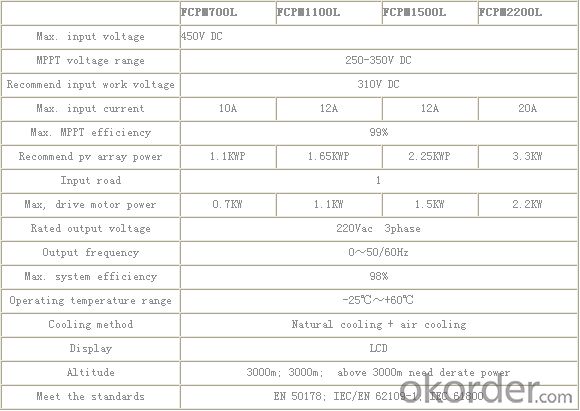
- Q: How noisy is a solar pump?
- A solar pump typically operates quietly, producing minimal noise during its operation. The noise level of a solar pump can be compared to a low hum or a soft whirring sound, which is barely noticeable in most cases. The absence of noisy components like combustion engines or mechanical parts in solar pumps contributes to their quiet operation. Overall, the noise generated by a solar pump is generally considered to be very low and does not cause any significant disturbances or disruptions.
- Q: Can a solar pump be used for water supply in horticulture farms?
- Yes, a solar pump can be used for water supply in horticulture farms. Solar pumps are an environmentally friendly and cost-effective solution for irrigation in farms, as they utilize solar energy to power the pump and provide water for irrigation. This eliminates the need for grid electricity or fuel, thus reducing operational costs and carbon emissions. Additionally, solar pumps can be easily installed and operated in remote areas where grid electricity is not available, making them an ideal choice for water supply in horticulture farms.
- Q: What is the maximum suction lift of a solar pump?
- The maximum suction lift for a solar pump is determined by several factors, including the pump's type and model, the suction line's size and quality, and the operating conditions. Typically, solar pumps have a maximum suction lift of approximately 6 to 8 meters (20 to 26 feet). It is crucial to keep in mind that surpassing this limit can result in diminished performance, cavitation, or even pump malfunction. To ascertain the precise maximum suction lift for a specific solar pump, it is advisable to refer to the manufacturer's specifications and guidelines.
- Q: Can a solar pump be used for water circulation in aquaculture systems?
- Yes, a solar pump can be used for water circulation in aquaculture systems. Solar pumps are environmentally friendly and can effectively circulate water in ponds or tanks, helping to maintain proper oxygen levels and overall water quality for the aquatic organisms in an aquaculture system.
- Q: Can a solar pump be used for water supply in a remote village or community?
- Yes, a solar pump can be used for water supply in a remote village or community. Solar pumps use solar energy to power the pump, eliminating the need for electricity or fuel. This makes them a cost-effective and sustainable solution for communities without access to conventional power sources. They can provide a reliable and continuous water supply, helping to improve living conditions and meet the water needs of remote villages or communities.
- Q: How do solar pumps compare to diesel or electric pumps in terms of efficiency?
- Solar pumps are generally more efficient than diesel or electric pumps. Solar pumps are powered by sunlight, which is a renewable and free energy source. They do not require any fuel or electricity to operate, resulting in lower operational costs and reduced carbon emissions. In contrast, diesel pumps require fuel, which can be expensive and contribute to pollution. Electric pumps may rely on grid electricity, which can be unreliable or unavailable in remote areas. Overall, solar pumps offer a more sustainable and cost-effective solution for pumping water.
- Q: How does the angle of the solar panel affect the performance of a solar pump?
- The angle of the solar panel directly affects the performance of a solar pump. The ideal angle of the solar panel should be set to maximize the amount of sunlight hitting the panel's surface. If the angle is too steep or too shallow, the efficiency of the solar pump may be compromised. An optimal angle ensures that the solar panel receives maximum sunlight, allowing it to generate more electricity and thereby increasing the performance of the solar pump.
- Q: Can solar pumps be used for water supply in community centers or social projects?
- Yes, solar pumps can certainly be used for water supply in community centers or social projects. Solar pumps are a sustainable and cost-effective solution that can provide a reliable source of water without relying on grid electricity or fuel-powered pumps. They can be easily installed and operated in remote areas where access to electricity is limited. Moreover, solar pumps have low maintenance requirements and can help reduce carbon emissions, making them an ideal choice for community centers or social projects focused on sustainability and environmental conservation.
- Q: Can a solar pump be used in areas with high temperature fluctuations?
- Yes, a solar pump can be used in areas with high temperature fluctuations. Solar pumps are designed to withstand a wide range of temperatures, including high temperature fluctuations. The components of a solar pump, such as the solar panels, controller, and motor, are built to operate efficiently in varying temperature conditions. However, it is important to ensure that the solar pump is installed and maintained properly to prolong its lifespan in such areas. Regular inspection and cleaning of the solar panels and other components will help optimize the performance and durability of the pump.
- Q: Are there any limitations to the flow rate of water a solar pump can handle?
- Indeed, there exist restrictions on the water flow rate that can be handled by a solar pump. Typically, the flow rate of a solar pump is determined by factors such as the pump's size, capacity, and the amount of sunlight available to power it. The maximum flow rate of the pump depends on its size and capacity. If the pump is undersized or possesses limited capacity, it may struggle to manage high water flow rates. In such instances, the pump may face difficulties in delivering water efficiently or may fail altogether in pumping water. Furthermore, the flow rate of the solar pump can also be influenced by the amount of sunlight accessible for powering it. Solar pumps rely on solar panels to convert sunlight into electricity, which is then utilized to operate the pump. Inadequate sunlight or improper positioning and maintenance of the solar panels can result in insufficient power supply to the pump, hindering it from operating at its maximum flow rate. It is worth mentioning that the flow rate of a solar pump may fluctuate based on the time of day and weather conditions. For instance, on cloudy days or during the early morning or late afternoon when the sun's intensity is diminished, the flow rate may decrease. Thus, although solar pumps offer a sustainable and environmentally friendly solution for water pumping, they do have limitations regarding flow rate. It is crucial to thoughtfully consider the pump's size, capacity, and ensure proper maintenance of the solar panels to optimize the water flow rate.
Send your message to us
Solar pump inverter FCPM1500L
- Loading Port:
- China Main Port
- Payment Terms:
- TT OR LC
- Min Order Qty:
- -
- Supply Capability:
- -
OKorder Service Pledge
Quality Product, Order Online Tracking, Timely Delivery
OKorder Financial Service
Credit Rating, Credit Services, Credit Purchasing
Similar products
Hot products
Hot Searches
Related keywords
